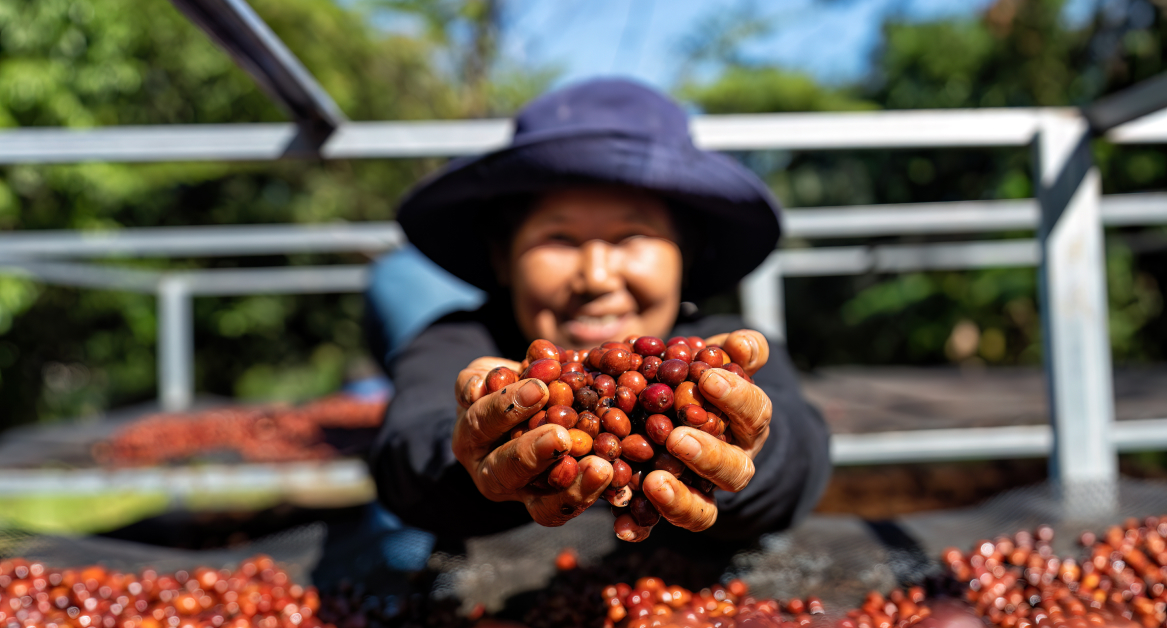Coffee, the beloved global beverage, is at a crossroads of change. As the European Union introduced the Deforestation Regulation (EUDR) to combat environmental concerns. Among the 7 trading goods getting impacts of the new law, coffee faces a monumental shift. The EUDR seeks to cut the connection between trading goods like coffee and forest destruction, requiring traders to clearly show where their products come from. This affects everyone from the farmers to the consumers. While it aims to help the environment, it also causes worry for small farmers and traders.
At RegenX, we’re stepping into the game, offering a new path forward for coffee sourcing that aligns with EUDR’s vision while supporting the livelihood of our farmers. As a financing platform for farmers in Southeast Asia who are transitioning to regenerative agriculture, we deliver financial returns to farmers and investors at every harvest season.

Now, let’s continue with the EU’s deforestation regulation for coffee.
Background of deforestation in coffee production
The journey of coffee from bean to cup has long been overshadowed by the specter of deforestation. The traditional agricultural practices employed in many coffee-producing regions involve clearing vast swaths of forest, leading to soil degradation, biodiversity loss, and increased greenhouse gases.
The consequences are dire: diminishing yields, compromised food security, and threatened livelihoods for farmers who are the backbone of the industry.
The EU’s response, the EUDR, represents a stand against these unsustainable practices, setting the stage for 2024 when the regulation will take effect. It’s an ambitious attempt to ensure that key commodities like coffee are produced without contributing to deforestation.
However, the challenge lies in the implementation. Farmers and traders are concerned about the costs of compliance and the feasibility of meeting the stringent demands of the EUDR, which could lead to increased scrutiny and potential market exclusion for those labeled as high-risk.
Transitioning to regenerative agriculture is more than just an environmental imperative; it’s a transformative journey for the entire coffee industry.
Impact on the coffee industry
The ripple effects of the EUDR within the coffee sector are significant.
Challenges of the EUDR for coffee producers
For coffee growers, particularly smallholders, the cost and logistical demands of compliance are steep. The need for parcel-level proof to ensure deforestation-free crops could deter small-scale farmers due to the expenses of obtaining the required aerial or satellite photography.
Complex supply chain
The coffee supply chain is labyrinthine, with numerous intermediaries involved. Ensuring traceability from farm to cup is a daunting task, further complicated by the EUDR’s stringent standards. However, it’s not just about compliance. There’s a real concern that ‘high-risk’ labels could stigmatize entire regions, leading to a reduction in their market appeal and potential exclusion from the EU market.
EU’s balancing between Act
The EU market’s response to the EUDR is a delicate dance of policy and practice. On one hand, the EU aims to fulfill its environmental commitments, and on the other, it seeks to maintain its status as a fair and viable trading partner. The upcoming implementation of the EUDR has brought about a sense of urgency to address these challenges, prompting the European Commission to devise a tiered benchmarking system. This system is intended to concentrate regulatory efforts where they are most needed, thereby reducing the burden on countries deemed low-risk.
New demand for clear sourcing
Coffee buyers are now more inclined towards sourcing transparency and are actively seeking ways to ensure that their products do not contribute to the problem of deforestation. In this evolving landscape, the role of technology and innovation in traceability becomes crucial. The use of satellite imagery and on-the-ground verifications are among the tools that are being considered to provide the necessary assurances of compliance.
As the EUDR gears up for implementation, the coffee industry is faced with the task of rethinking its practices. This isn’t merely a compliance issue—it’s a pivotal moment that could redefine the future of coffee trading. The industry must navigate through this change, balancing the scales of economic viability and environmental responsibility.
The goal is to cultivate a resilient coffee market that values both the quality of its products and the ethical considerations of its production methods. This shift towards a sustainable coffee trade is not only about meeting regulatory demands but also about building a legacy of conscientious consumption and production that will endure for generations to come.
The EU Market’s Response to EUDR
Businesses are exploring innovative solutions to trace the origins of their coffee imports, ensuring they meet the EUDR standards. This includes investing in technology for better supply chain oversight and collaborating with producers to assist them in meeting the compliance criteria. Such partnerships are essential, particularly for small-scale farmers who may lack the resources to navigate the complexities of the new regulation on their own.
As the EUDR has prompted a significant shift towards sourcing transparency and sustainability, RegenX joins in to offer a direct connection between buyers and responsible regenerative coffee farmers while delivering financial returns to farmers and investors for every harvest season.
The EUDR also has a broader impact on consumer behavior, with European buyers increasingly aware of the environmental footprint of their purchases. There’s a notable trend towards ethical consumption, where buyers prioritize products that are not just high in quality but also sustainably sourced.
However, the regulation is not without its critics, who argue that the stringent requirements could disadvantage producers in developing countries, potentially disrupting their access to one of the world’s largest coffee markets.
A Vietnamese perspective on coffee exporting
The EUDR demands that all such imports into the EU, notably coffee, must demonstrate traceability at the farm level. This requirement aims to curb deforestation linked to European consumption, posing both challenges and opportunities for Vietnamese coffee farmers.
In response to the EUDR, Vietnam’s Ministry of Agriculture and Rural Development (MARD), in collaboration with the EU Delegation and the IDH – The Sustainable Trade Initiative, has been proactive in addressing the impending changes. A national action plan has been presented to support the coffee sector’s compliance with the EUDR within the 18-24 month preparation period set by the EU.
Vietnam’s strategy involves harnessing the potential of public-private partnerships to meet the new regulations. This collaborative approach is seen as a critical step towards a transformation in the coffee sector, emphasizing transparency and sustainability. Moreover, the EUDR is viewed not only as a compliance requirement but also as a catalyst to accelerate Vietnam’s agricultural development towards green growth.
The EU’s support for Vietnam’s sustainable development is evident, and the EUDR is a part of broader initiatives like the Green Deal and the Farm to Fork strategy. These policies aim to ensure responsible production, natural resource protection, and social inclusion within the coffee industry, ultimately contributing to the environmental and economic well-being of Vietnamese citizens and preserving the country’s natural heritage.



